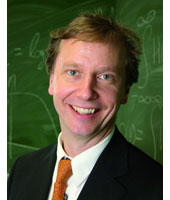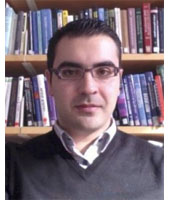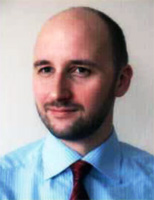Gerhard Fettweis (Vodafone / TU Dresden)

Gerhard Fettweis earned his Ph.D. under H. Meyr's supervision from RWTH Aachen in 1990. After one year at IBM Research in San Jose, CA he moved to TCSI Inc., Berkeley, CA. Since 1994 he is Vodafone Chair Professor at TU Dresden, Germany, with currently 20 companies from Asia/Europe/US sponsoring his research on wireless transmission and chip design. He coordinates 2 DFG centers at TU Dresden, cfAED and HAEC.
Gerhard is IEEE Fellow, member of acatech, has an honorary doctorate from TU Tampere, and has received multiple awards. In Dresden he has spun-out ten start-ups, and setup funded projects of more than EUR 1/3 billion volume. He has helped organizing IEEE conferences, most notably as TPC Chair of IEEE ICC 2009, IEEE TTM 2012, and General Chair of VTC Spring 2013. He remains active within IEEE.
Contact: fettweis@ifn.et.tu-dresden.de
Themis Prodromakis (University of Southampton)

Dr Themis Prodromakis is a Reader in Nanoelectronics and EPSRC Fellow within the Nano Research Group and the Southampton Nanofabrication Centre of the ECS department at University of Southampton. He is also a Honorary Research Fellow within Imperial College London. He previously held a Corrigan Fellowship in Nanoscale Technology and Science, funded by the Corrigan Foundation and LSI Inc., within the Centre for Bio-inspired Technology at Imperial College and a Lindemann Trust Visiting Fellowship in EECS UC Berkeley. His background is in Electron Devices and micro/nano-electronics processing techniques, with his research being focused on bio-inspired devices for biomedical applications.
He received his PhD (Application of Maxwell-Wagner Polarisation in Monolithic Technologies) from the Circuits and Systems Group (Department of Electrical and Electronic Engineering) at Imperial in 2008, during which he successfully pioneered the use of interfacial polarisations for demonstrating miniature passive devices. In 2006 he contributed in setting up the Cleanroom facilities and the Microelectronics Laboratory at the IBE. His research has led in establishing a wide-number of bio-inspired devices and technologies for mimicking biological functions as well as linking these with electronics, with some examples including: memristive elements, integrated CMOS chemical sensors, cell-culture platforms, biocompatible encapsulation techniques, advanced neural interfaces and lately ion-channel mimetic (single-molecule) transducers.
Dr Prodromakis is a Senior Member of the IEEE, and a Member of the INE and the IET, and also serves as member of the BioCAS, Nano-Giga and Sensory Systems Technical Committees of the IEEE Circuits & Systems Society.
Contact: t.prodromakis@soton.ac.uk
Bogusław Cyganek (AGH University of Science and Technology)

Bogusław Cyganek received his M.Sc. degree in electronics in 1993, and then M.Sc. in computer science in 1996, from the AGH University of Science and Technology, Krakow, Poland. He obtained his Ph.D. degree cum laude in 2001 with a thesis on correlation of stereo images, and D.Sc. degree in 2011 with a thesis on methods and algorithms of object recognition in digital images.
During recent years dr. Bogusław Cyganek cooperated with many scientific and industrial partners such as Glasgow University Scotland UK, DLR Germany, and Surrey University UK, as well as Nisus Writer, USA, Compression Techniques, USA, Pandora Int., UK, and The Polished Group, Poland. He is an associated professor at the Department of Electronics of the AGH University of Science and Technology, Poland, as well as a visiting professor to the Wroclaw Technical University.
His research interests include computer vision, pattern recognition, data mining, as well as development of as well as books with the latest “Object Detection and Recognition in Digital Images: Theory and Practice” published by Wiley in 2013. Dr. Cyganek is a member of the IEEE, IAPR and SPIE.
Contact: cyganek@agh.edu.pl
